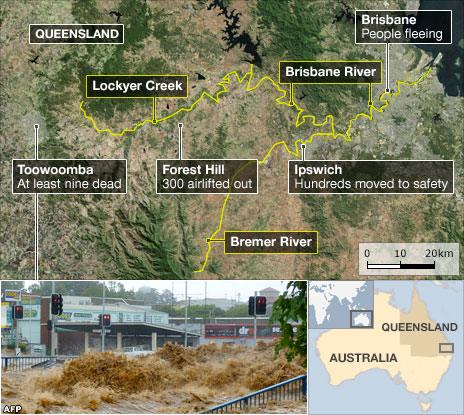Australia floods: Brisbane braces for surge
- Published
Footage shot by David Jutsum in Toowoomba shows cars being swept away
Thousands of people have been urged to leave parts of Australia's third largest city, Brisbane, which is facing its worst flooding in decades.
Officials say between 6,500 and 9,000 homes and businesses are set to flood in Queensland's state capital.
Streets are largely empty and families have moved to refuge centres in some areas, with the peak of the flooding expected on Wednesday and Thursday.
Flash floods across Queensland have left 10 dead and more than 70 missing.
Some 200,000 people have been affected.
The flooding has caused billions of dollars worth of damage.
Brisbane is facing a combined surge of water from the flooded Lockyer Valley and the Wivenhoe Dam, which is so full it has been forced into controlled releases.
Authorities fear the Brisbane River will go beyond the 5.45m (17.9ft) peak that was reached during the devastating floods of 1974.
The river snakes its way through the centre of the city and in places it has burst its banks already, says BBC Australia correspondent Nick Bryant, in Brisbane.
Cars have been streaming out of the city and office workers have been fleeing the main business district, while lower lying suburbs have already been inundated.
Sandbags have been given out to residents in the city of two million people. About 1,500 people are already sheltering in centres.
Mayor Campbell Newman said: "Today is very significant, tomorrow is bad, and Thursday is going to be devastating for the residents and businesses affected."
The Brisbane Courier Mail, external reports that electricity in the city's central business district will be shut off from 0700 local time (2100 GMT Tuesday), affecting 100,000 homes and businesses.
Energy officials will then check substations following the afternoon's high sea tides to determine a reconnection timetable, the paper said.
State Premier Anna Bligh urged people to prepare themselves: "We need to make every effort to stay calm and stick together. If you live on high ground, now is the time to reach out and offer help to neighbours... and offer a bed for the night.
"I think the entire city of Brisbane, the Ipswich region and most of the south-east, needs to prepare ourselves for enormous disruption."
One resident of Brisbane's Indooroopilly suburb, Jiao Yu, told the BBC that supermarkets were already running out of food.
"I went to the supermarket just now and almost all the food has been taken - all people I saw on the streets seemed to be anxious, and shops and railways here have begun to stop running."
'Darkest hour'
In Toowoomba, just west of Brisbane, flash floods killed at least 10 people with more than 70 missing.
Toowoomba resident Jenny Mullholland: "Roads were like rivers"
A raging torrent of water hit Toowoomba on Monday without warning, following more than 36 hours of incessant rain.
A huge search-and-rescue operation was mounted, with helicopters winching people to safety. Many residents clung for their lives to trees or railings, or were trapped in cars or on the roofs of buildings.
At least two of the dead were children, and Prime Minister Julia Gillard has warned that the death toll is likely to rise.
Ms Bligh called the flash floods Queensland's "darkest hour" since the floods began at the end of November.
"This has been a night of extraordinary events," Ms Bligh told a news conference on Tuesday.
"We've seen acts of extreme bravery and courage from our emergency workers. We know they're out on the front line desperately trying to begin their search-and-rescue efforts, and we know we have people stranded and people lost," she said.
She called the event "a complete freak of nature", saying the flooding had come "out of nowhere".
Toowoomba mayor Peter Taylor told BBC Radio 4 on Tuesday: "We're working 24 hours a day responding on a emergency number for people who need any assistance in terms of evacuation."
Toowoomba resident Charlie Green told the BBC he was stranded by the floods.
"It would be ironic if it wasn't so tragic," he said. "Toowoomba sits in the cradle of an extinct volcano about 2,000ft (610m) above sea level, and we have just endured 10 years of drought, unable even to wash our cars with town water for the last several years."
The flooding has been so widespread that while some communities are still bracing themselves for the worst, in others the clean-up is well under way.
The forecast is for more rain to come, and there are reports of flooding in neighbouring New South Wales.
